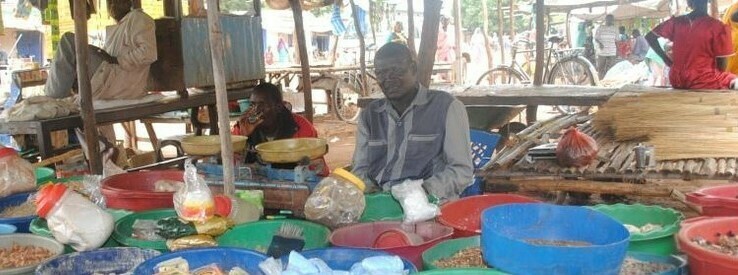The prices of food items are on the rise in the Abyei Area despite a government subsidy intervention program that has seen whole-sale distribution of sorghum across markets in attempts to lower commodity prices.
Chol Kuol Miyen, Secretary of the Chamber of Commerce in the Abyei Special Administrative Area told Radio Tamazuj on Friday that prices are skyrocketing but the government is fighting this problem by supplying sorghum to designated sales-centers.
“The government has introduced sorghum to the markets with the aim of reducing the price of malwa from SSP 2,500 to SSP 1,500 at government selling points. The shop in front of me is selling it at SSP 1,500 because the government has supplied markets with 20 large sacks of sorghum, with each sack containing 30 malwas. The government is prepared to bring in more sorghum to address the situation,” he stated.
Kuol highlighted a rise in the prices of various food commodities due to a shortage of supply. “The price of a 50-kilogram bag of sugar has significantly increased, now costing SSP 75,000 compared to the previous SSP 42,000. Additionally, the large sack of flour has risen to SSP 48,000 from SSP 35,000 in September. The 25-kilogram sack of beans has gone from SSP 100,000 to SSP 95,000, and the sack of rice now stands at SSP 30,000, up from SSP 25,000. Similarly, the sack of lentils is now priced at SSP 30,000,” he explained.
Chol added that they don’t have a solution to control prices of other food commodities but he said that their office is engaging the government to manage and control prices of essential commodities.
Sandrella Arop Deng, a resident of Abyei, expressed concern about the high prices of items, including malwa of sorghum, in Abyei town.
“I am currently in the market, and the 15-liter oil container is being sold at SSP 40,000, up from SSP 30,000. The price of a 50 kg bag of flour is SSP 50,000, and I am unsure of its previous cost as I just came from Sudan. A 25 kg bag of sugar is priced at SSP 50,000, while the sack of onions costs SSP 200,000. Malwa of onion is priced at SSP 10,000, and a 25 kg bag of rice is now SSP 40,000,” she reported.
Sandrella Arop Deng, an Abyei resident, refuted government claims of sorghum supply to lower malwa prices and highlighted the challenges faced by the community.
“I want to say that there is no government supply of dura to reduce the price of malwa. The cost of living is challenging, with many people struggling to cook meals due to the unavailability of essential ingredients like onions. If you’re fortunate, you might find sorghum for purchase. However, I haven’t observed any government efforts to supply sorghum in an attempt to lower market prices. I can confirm a reduction in the price of a malwa of groundnuts from SSP 1,500 to SSP 1,000. Additionally, the price of beef has decreased from SSP 4,800 to SSP 3,500 per kilogram,” Sandrella clarified.
Meanwhile, Bol Koc, the Minister of Information in Abyei, affirms that government intervention has contributed to a reduction in the prices of essential items in the region.
“The security situation along all borders is currently stable. The government is actively supplying sorghum to all markets in Abyei to ensure that residents can purchase dura at an affordable price. The price had reached SSP 2,500, and the area administration is now supplying sorghum from strategic food stores,” he stated.
He further explained, “We supply markets on a weekly basis at every sales point in Abyei, including Akec-Nhial, Mading-Achueng, Abithok, Shuk-chabi, Mulmul, and Amothbek near the hospital. Each location receives 20 sacks to ensure that civilians can access it at a subsidized price. This initiative is aimed at improving the living conditions of the people in Abyei.”




